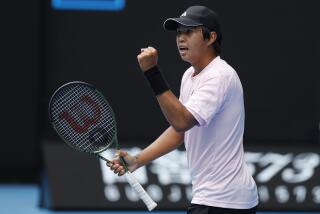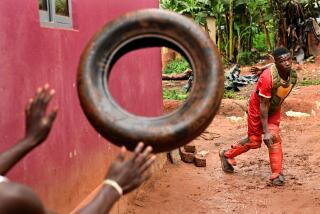Kenyan Comes to the U.S. in Search of Better Game : Young Tennis Player Is Also Learning About Racism While Attending Chapman College
- Share via
The moment is not one Paul Wekesa savors. After flying 28 hours from Nairobi, Kenya, Wekesa landed at Orange County’s John Wayne Airport only to be greeted by the Chapman College soccer team.
One problem: he came to the private school in Orange to play tennis, and though the members of the soccer team were hospitable, he felt lost.
Welcome to the New World, where his culture often is misunderstood and his identity often mistaken.
If Kenya’s No. 1 junior tennis player had a rather portentous entry into the United States, what he has experienced in the six weeks since has been downright disappointing.
“When I tell whites I’m from Africa, they sort of laugh,” Wekesa said. “They think they’re superior or something because I’m African. They sort of look down at you. They think it’s such a rundown place, so when they hear you’re from Africa they say ‘How did he come here?’ and stuff like that. I don’t care what they think.”
Wekesa faces the cumbersome task of enduring a society ignorant to his way of life. He often is asked if he lived in a bamboo-grass hut and fended off the jungle’s most heinous wildlife.
The truth is, Wekesa comes from a well-to-do family. His father, Noah, a veterinarian in Nairobi, owns a 2,000-acre farm near Kitale, a city in western Kenya close to the Ugandan border. But Wekesa is no farm boy. He said he seldom goes to the farm, though his parents spend a lot of time there. He was reared in the country’s capital, Nairobi, one of the most European-flavored cities in Africa, and has studied abroad in England.
Kenya, one of East Africa’s most prosperous countries, was a British colony until 1963. It is bounded on the south by Tanzania, on the west by Uganda, northwest by Sudan, on the north by Ethiopia and northeast by Somalia.
“I think Americans see things about Ethiopia, and they think the rest of Africa is like that because that’s all they get on TV here about Africa,” Wekesa said.
Wekesa’s teammate, Terry Davis, a black transfer from Compton College, said: “White people always have their little comments about the brothers from Africa. Jungle bunnies and all this other stuff and so forth. They only thing they associate Africa with is jungle and tribe. But they just really don’t know what Africa is all about.”
Said Chapman tennis Coach Mike Edles, who first met Wekesa last December at the international Orange Bowl tennis tournament at Miami: “In Orange County, these kids are just so sheltered and all they know about Africa is what they see on Wild Kingdom.”
Kenya is a country plentiful in lions, tigers and snakes, which the country’s tourist bureau advertises to attract visitors to its vast national parks and wildlife preserves. But it also is a sophisticated country, internationally known in athletics for its outstanding distance runners.
Said Vicky Koerner, the director of the Chapman international students program: “Orange County is quite provincial, and that’s the attitude of most people on campus. I don’t think the Africans stand out as a group because there are a lot of blacks. So, the white students look at them as being the same.”
But it takes time to blend in, and Wekesa still is adjusting to the quintessence of Southern California life: fast-food restaurants and driving on the opposite side of the road from Kenyans. Also, Wekesa says academic standards are much more lax than he faced at the Hillcrest Secondary School in Kenya and at the Millfield Boys School in England.
Like most Kenyans, Wekesa graduated from secondary school at age 16. Afterward, he took a year’s hiatus. When he started at Chapman six weeks ago, he expected a rough time with his studies. With a major in biology, he even skipped a tennis match against USC in order to attend classes during his first week. Now he realizes he needn’t worry; his classes are much easier than he anticipated.
“Americans seem to take academics more easily,” he said.
But Wekesa, 17, came to the United States to learn tennis, a game the Americans are well schooled in. Tennis is in its embryonic state in Kenya, which is to Wekesa’s advantage in the rankings. He was taught by his father, who has played a major role in getting him into a U.S. school.
“Paul is playing good tennis, considering he doesn’t have one-tenth the coaching these kids get,” his father said in a telephone interview from Kenya. “I think the college game will shape him up a bit.”
Wekesa started receiving informal tennis lessons from his father at age 7. He hasn’t had an instructional coach until Edles this spring, although he has attended camps in England.
Because Wekesa was a virtual unknown on the tennis circuit, his father had difficulty in convincing U.S. collegiate coaches of his son’s merits. He tried for three years to get Paul a scholarship, but has failed--Wekesa is playing at Chapman as a walk-on.
Chapman wasn’t the Wekesas’ choice when they came courting California tennis schools three years ago. During two trips to the United States, Noah Wekesas tried to find a school within the University of California system for his son. But the coaches weren’t interested in an unknown, and Noah was left looking at smaller private schools before deciding on Chapman.
Wekesa discovered Chapman through a fellow countryman, Tim Iseyne, who was living in Orange. Wekesa wrote Edles to find out about the tennis program, and Paul finally met the coach last December. Still, Wekesa wasn’t offered a scholarship.
Not many were impressed that he had won three straight Kenyan Open juniors tournaments. If Wekesa returns in July and wins a fourth title, it will be unprecedented in Kenyan tennis history.
Margaret Walker, a secretary for the Kenyan Lawn Tennis Assn., said there are only six to eight juniors ranked in the country. Hundreds are ranked in the United States, and thousands more are playing highly competitive tennis.
Wekesa’s hopes to make a big smash at Wimbledon this summer--if Kenya decides to send him to the world’s premier tennis tournament.
And then, he’ll decide whether or not to return to Chapman.
His decision, he said, has nothing to do with the attitudes of fellow students, but rather on his tennis progress.
“I don’t really want to leave (Chapman),” Wekesa said, “but if my tennis really improves I’d like to go to a school that is really tough in tennis.”
The Panthers were ranked second in the NCAA Division II preseason poll and are expected to challenge for the Division II title later in the season. Wekesa, who plays No. 5 singles, has lost twice in 10 singles matches. He made the team three weeks ago after beating the No. 6 player, Paul Charlesworth. He hopes to move to the No. 4 spot by the season’s end.
Wekesa said his chances of getting a scholarship are slim because Edles knows he may leave after the season. But he must think of his future if he is to help Kenya become competitive in tennis.
And if he should leave Chapman after the season, he knows the stay was worth the hassles. The New World has taught him something about adjusting to changes.
More to Read
Go beyond the scoreboard
Get the latest on L.A.'s teams in the daily Sports Report newsletter.
You may occasionally receive promotional content from the Los Angeles Times.










